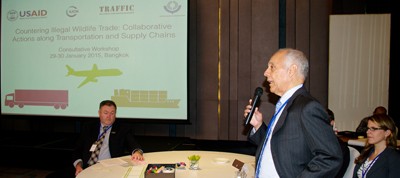
For Immediate Release
BANGKOK, January 29, 2015—Representatives from across the transportation and logistics sector today joined customs officials, supply chain experts and wildlife professionals for the start of a two-day consultative workshop to find actionable solutions to deter wildlife smuggling activities while strengthening supply chains and corporate policies.
Delegates from key shipping and logistics companies, airlines, couriers and transport associations are participating in the meeting, which is being convened by TRAFFIC and the World Customs Organization (WCO), with the support of the United States Agency for International Development (USAID) and the Wildlife Trafficking Response, Assessment and Priority Setting (TRAPS) Project.
Transportation is the backbone of global trade, and traffickers in wild animals and wildlife products rely heavily on logistics, land, air and sea carriers to smuggle illicit goods. Companies from the transportation and logistics sector can therefore play a critical role in identifying and strengthening key risk points in the supply chain.
“We are pleased to see how the global transport industry is becoming part of the co-ordinated international response to the poaching crisis that seeks to put an end to wildlife trafficking,” said U.S. Embassy Chargé d’affaires W. Patrick Murphy.
The ivory trade is just one example of how illicit trafficking can impact negatively on a species. In African Elephant range countries more than 20,000 elephants are killed every year – a massacre fuelled by the greed of organized networks that trade in illegal ivory. This kind of environmental crime is eroding the rule of law, decimating the world’s natural heritage, and eliminating many economic opportunities for local communities that depend on these critical resources.
“Together TRAFFIC and the WCO are spearheading a bold new initiative with the transport sector to prevent and deter illegal trade in wildlife products,” said TRAFFIC’s Nick Ahlers, Project Leader of Wildlife TRAPS.
“There has been worldwide condemnation of the rampant poaching of elephants, tigers, rhinos and other iconic species, and now the transport sector is using its combined might to prevent the transport of threatened wildlife and their associated products across the planet.”
The WCO is a key agency in the global effort to stop wildlife crime, acting as an interface with private sector transportation and logistics companies whose members are on the frontline in detecting and inspecting illegal shipments.
“Given the sheer volume of global trade, Customs authorities rely on information and intelligence to combat wildlife trafficking, and this week we are developing the means by which the legitimate transport sector is best able to support co-ordinated international efforts against this growing crisis,” said Leigh Winchell, WCO Deputy Director for Enforcement and Compliance.
The scale of the challenge is considerable, with millions of cargo containers being transported by air and sea services every day. According to reports, approximately 38 million tons of air cargo were to be transported in 2014, and it is estimated that global container port throughput will exceed 840 million twenty-foot equivalent units by 2018.
Faced with mountains of cargo moving around the world, Customs, other law enforcement agencies and their partners have their work cut out for them. Currently, most seizures of containers carrying contraband are made through a combination of targeted risk assessment, combined with good intelligence, and random selection.
The TRAFFIC/WCO workshop follows shortly after the announcement of the creation of a taskforce under the ‘United for Wildlife’ banner by his Royal Highness Prince William of the United Kingdom, which is specifically designed to work with the transportation sector. The outcomes from the Bangkok meeting will be shared with the newly created task force.
Read remarks by USAID Mission Director Michael Yates at the event.







Comment
Make a general inquiry or suggest an improvement.